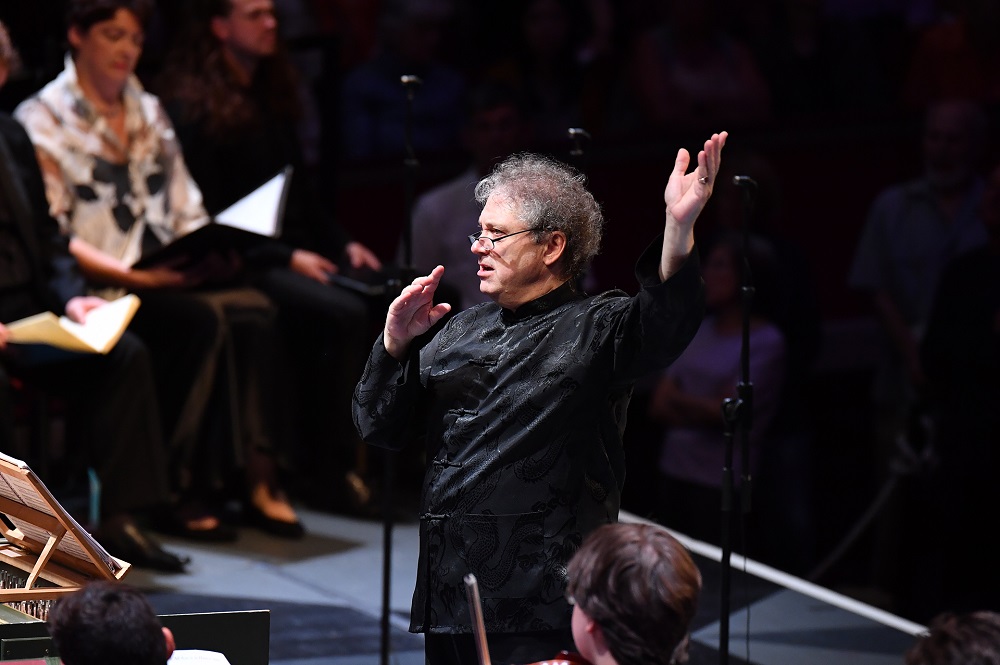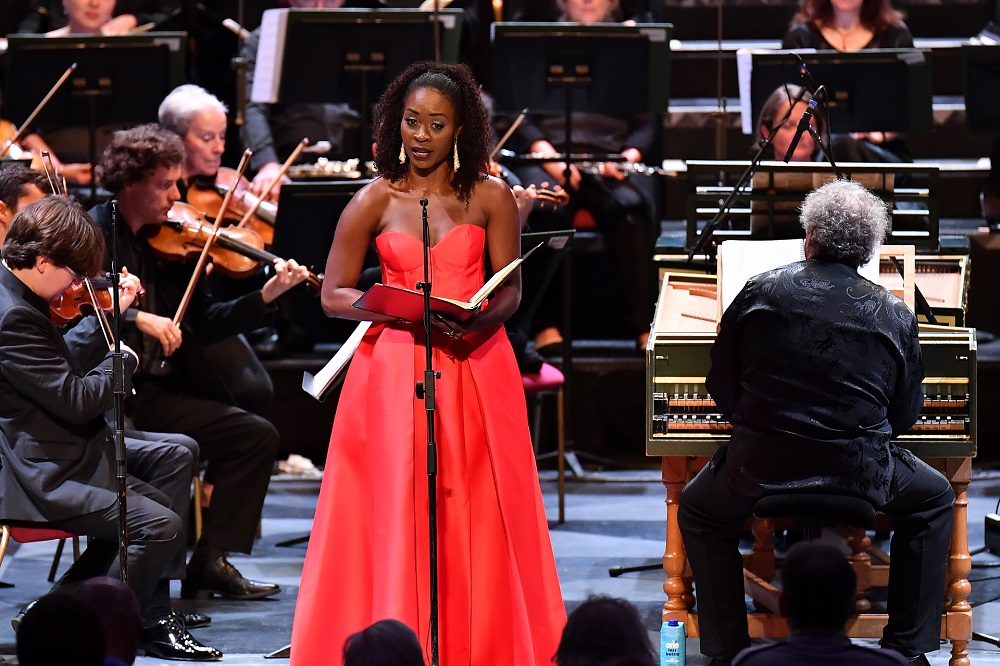Prom 55: Jephtha, SCO & Chorus, Egarr review - shock of the new in sacrificial oratorio | reviews, news & interviews
Prom 55: Jephtha, SCO & Chorus, Egarr review - shock of the new in sacrificial oratorio
Prom 55: Jephtha, SCO & Chorus, Egarr review - shock of the new in sacrificial oratorio
Handel's searing response to Old Testament horror strikes afresh
Human sacrifice has a disconcerting and wonderful effect upon great composers, above all when it involves the supremely queasy issue of a father vowing to offer up his child: think of Britten with Abraham and Isaac, Mozart with Idomeneo and Idamante, Gluck with Agamemnon and Iphigenia, and here Handel with Jephtha and Iphis in his last oratorio.
Changing lines from Pope ending "what God ordains is right" to "whatever is, is right", Handel has the chorus hurl them out between pregnant silences. Nothing could have been more astounding than the way the SCO Chorus articulated them here under Richard Egarr, more as a series of angry question marks. This had to be one of the best performances ever from an amateur choir, all the better for the fact that the focus was never pulled from them as it had been from the Welsh and English National Opera choruses in Katie Mitchell's awkwardly blocked production, surplus (as this proved) to need. 
In the solo line-up, the men had the vivid edge on the leading ladies. Both Trinidadian soprano Jeanine De Bique (pictured below with Egarr at the harpsichord) as sacrifice-to-be Iphis and Welsh-born contralto Hilary Summers as her mother Storgè have voices in a thousand, utterly distinctive of hue, but didn't always energise the sound to hit the back of the hall, though there were melting moments; that you don't need a big instrument to project was eventually demonstrated by Rowan Pierce as the merciful angel of the oratorio (no such reprieve in the horrid Old Testament). 
Countertenor Tim Mead produced ravishing sounds - none better in the business - as the slightly marginal lover Hamor, who resigns his Iphis to heavenly care as a perpetual virgin in the penultimate Quintet (yes, Quintet - how close to Mozart Handel might have come if he'd composed for another decade or so). That's capped, of course, by the final blaze: the work ultimately belongs to chorus and orchestra, and the loudest cheers at the end duly honoured them.
rating
Share this article
The future of Arts Journalism
You can stop theartsdesk.com closing!
We urgently need financing to survive. Our fundraising drive has thus far raised £49,000 but we need to reach £100,000 or we will be forced to close. Please contribute here: https://gofund.me/c3f6033d
And if you can forward this information to anyone who might assist, we’d be grateful.

Subscribe to theartsdesk.com
Thank you for continuing to read our work on theartsdesk.com. For unlimited access to every article in its entirety, including our archive of more than 15,000 pieces, we're asking for £5 per month or £40 per year. We feel it's a very good deal, and hope you do too.
To take a subscription now simply click here.
And if you're looking for that extra gift for a friend or family member, why not treat them to a theartsdesk.com gift subscription?
more Classical music
 Cooper, Hallé, Elder, Bridgewater Hall, Manchester review - a taste of the slightly unexpected
A trusted guide and an imaginative soloist charm the crowd
Cooper, Hallé, Elder, Bridgewater Hall, Manchester review - a taste of the slightly unexpected
A trusted guide and an imaginative soloist charm the crowd
 Hallé John Adams festival, Bridgewater Hall / RNCM, Manchester review - standing ovations for today's music
From 1980 to 2025 with the West Coast’s pied piper and his eager following
Hallé John Adams festival, Bridgewater Hall / RNCM, Manchester review - standing ovations for today's music
From 1980 to 2025 with the West Coast’s pied piper and his eager following
 Kaploukhii, Greenwich Chamber Orchestra, Cutts, St James's Piccadilly review - promising young pianist
A robust and assertive Beethoven concerto suggests a player to follow
Kaploukhii, Greenwich Chamber Orchestra, Cutts, St James's Piccadilly review - promising young pianist
A robust and assertive Beethoven concerto suggests a player to follow
 Robin Holloway: Music's Odyssey review - lessons in composition
Broad and idiosyncratic survey of classical music is insightful but slightly indigestible
Robin Holloway: Music's Odyssey review - lessons in composition
Broad and idiosyncratic survey of classical music is insightful but slightly indigestible
 Classical CDs: Wolf-pelts, clowns and social realism
British ballet scores, 19th century cello works and contemporary piano etudes
Classical CDs: Wolf-pelts, clowns and social realism
British ballet scores, 19th century cello works and contemporary piano etudes
 Bizet in 150th anniversary year: rich and rare French offerings from Palazzetto Bru Zane
Specialists in French romantic music unveil a treasure trove both live and on disc
Bizet in 150th anniversary year: rich and rare French offerings from Palazzetto Bru Zane
Specialists in French romantic music unveil a treasure trove both live and on disc
 Scottish Chamber Orchestra, Ibragimova, Queen’s Hall, Edinburgh review - rarities, novelties and drumrolls
A pity the SCO didn't pick a better showcase for a shining guest artist
Scottish Chamber Orchestra, Ibragimova, Queen’s Hall, Edinburgh review - rarities, novelties and drumrolls
A pity the SCO didn't pick a better showcase for a shining guest artist
 Kilsby, Parkes, Sinfonia of London, Wilson, Barbican review - string things zing and sing in expert hands
British masterpieces for strings plus other-worldly tenor and horn - and a muscular rarity
Kilsby, Parkes, Sinfonia of London, Wilson, Barbican review - string things zing and sing in expert hands
British masterpieces for strings plus other-worldly tenor and horn - and a muscular rarity
 From Historical to Hip-Hop, Classically Black Music Festival, Kings Place review - a cluster of impressive stars for the future
From quasi-Mozartian elegance to the gritty humour of a kitchen inspection
From Historical to Hip-Hop, Classically Black Music Festival, Kings Place review - a cluster of impressive stars for the future
From quasi-Mozartian elegance to the gritty humour of a kitchen inspection
 Shibe, LSO, Adès, Barbican review - gaudy and glorious new music alongside serene Sibelius
Adès’s passion makes persuasive case for the music he loves, both new and old
Shibe, LSO, Adès, Barbican review - gaudy and glorious new music alongside serene Sibelius
Adès’s passion makes persuasive case for the music he loves, both new and old
 Anja Mittermüller, Richard Fu, Wigmore Hall review - a glorious hall debut
The Austrian mezzo shines - at the age of 22
Anja Mittermüller, Richard Fu, Wigmore Hall review - a glorious hall debut
The Austrian mezzo shines - at the age of 22

Add comment